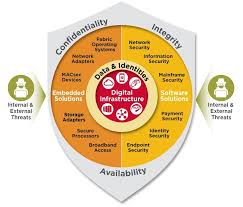Enhancing Business Resilience with Enterprise Security Solutions
In today’s digital landscape, businesses face an ever-evolving array of cyber threats that can compromise sensitive data, disrupt operations, and damage reputation. To mitigate these risks and ensure business continuity, organisations are increasingly turning to robust enterprise security solutions.
Enterprise security solutions encompass a range of technologies and practices designed to protect a company’s network, systems, and data from cyber threats. These solutions go beyond traditional antivirus software and firewalls to provide comprehensive protection against advanced threats such as malware, ransomware, phishing attacks, and insider threats.
One key component of enterprise security is network security, which involves securing the network infrastructure to prevent unauthorised access and protect data in transit. This includes implementing firewalls, intrusion detection systems, virtual private networks (VPNs), and other tools to monitor and control network traffic.
Another critical aspect of enterprise security is endpoint security, which focuses on securing individual devices such as laptops, desktops, mobile devices, and servers. Endpoint security solutions include antivirus software, encryption tools, device management systems, and endpoint detection and response (EDR) platforms to detect and respond to threats at the device level.
Identity and access management (IAM) is also vital for enterprise security, as it ensures that only authorised users have access to sensitive data and systems. IAM solutions include user authentication mechanisms such as multi-factor authentication (MFA), single sign-on (SSO), and privilege management tools to control user access rights.
Furthermore, data loss prevention (DLP) solutions help enterprises prevent the unauthorised disclosure of sensitive information by monitoring data in motion, at rest, and in use. DLP tools use content inspection techniques to identify and protect confidential data from being leaked or stolen.
By implementing a holistic approach to enterprise security that combines network security, endpoint security, IAM, DLP, and other technologies, businesses can enhance their resilience against cyber threats. Investing in robust enterprise security solutions not only protects valuable assets but also instils confidence among customers and partners.
In conclusion, safeguarding your business against cyber threats requires a proactive approach that leverages advanced enterprise security solutions. By prioritising cybersecurity measures tailored to your organisation’s needs and staying abreast of emerging threats, you can fortify your defences and ensure the continuity of your operations in an increasingly digital world.
Understanding Key Aspects of Enterprise Security Solutions: Plans, Solutions, Management, and Cyber Security
- What is an enterprise security plan?
- What is enterprise security solution?
- What is enterprise security management?
- What is enterprise cyber security?
What is an enterprise security plan?
An enterprise security plan is a comprehensive strategy developed by organisations to protect their digital assets, data, and systems from potential cyber threats. It outlines the security measures, policies, procedures, and technologies that the company will implement to safeguard its network infrastructure and sensitive information. An effective enterprise security plan typically includes risk assessments, incident response protocols, access control mechanisms, employee training initiatives, encryption methods, and regular security audits to ensure ongoing protection against evolving cybersecurity risks. By creating and adhering to an enterprise security plan, businesses can proactively mitigate vulnerabilities and enhance their resilience in the face of cyber threats.
What is enterprise security solution?
An enterprise security solution refers to a comprehensive set of technologies, practices, and strategies designed to safeguard a company’s network, systems, and data from a wide range of cyber threats. It goes beyond basic antivirus software and firewalls to provide advanced protection against sophisticated attacks such as malware, ransomware, phishing attempts, and insider threats. Enterprise security solutions typically include network security measures, endpoint security tools, identity and access management systems, data loss prevention mechanisms, and other proactive measures aimed at fortifying the organisation’s cybersecurity posture. By deploying an enterprise security solution tailored to their specific needs, businesses can enhance their resilience against cyber risks and protect their valuable assets from potential breaches.
What is enterprise security management?
Enterprise security management refers to the comprehensive approach taken by organisations to protect their network, systems, and data from a wide range of cyber threats. It involves the strategic implementation of security policies, procedures, and technologies to safeguard sensitive information, ensure regulatory compliance, and mitigate risks. Enterprise security management encompasses various aspects such as risk assessment, incident response planning, access control, encryption, monitoring and analysis of security events, and ongoing security awareness training for employees. By adopting effective enterprise security management practices, businesses can enhance their resilience against cyber attacks and safeguard their critical assets in today’s increasingly digital environment.
What is enterprise cyber security?
Enterprise cybersecurity refers to the comprehensive set of strategies, technologies, and practices that organisations implement to safeguard their network, systems, and data from cyber threats. It encompasses a proactive approach to identifying, preventing, detecting, and responding to a wide range of security risks that could compromise the confidentiality, integrity, and availability of sensitive information. Enterprise cybersecurity solutions are tailored to the specific needs of businesses and typically include measures such as network security, endpoint protection, identity and access management, data loss prevention, and security awareness training. By adopting robust enterprise cybersecurity measures, organisations can strengthen their resilience against cyber attacks and maintain the trust of their stakeholders in an increasingly interconnected digital environment.

